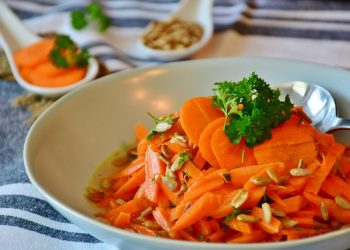Did you know that your bones are living tissues? They’re constantly breaking down and rebuilding, much like any other part of your body. With this in mind, the food you eat plays a crucial role in maintaining healthy bones. One often overlooked hero in this department is broccoli. Yes, that little green tree on your plate is not just for decoration. Let’s dive into five broccoli benefits that can help keep your bones strong and healthy!
Contents
1. Rich Source of Vitamin K
What It Does
Vitamin K is essential for bone health. It helps in the synthesis of osteocalcin, a protein that binds calcium to the bone matrix, making bones stronger and less prone to fractures. Broccoli is packed with vitamin K—one cup of cooked broccoli contains about 110% of your daily recommended intake.
The Research
A study published in the American Journal of Clinical Nutrition in 2017 found that higher dietary vitamin K intake is associated with greater bone mineral density in older adults. Researchers noted that those who consumed adequate amounts of vitamin K had a lower risk of fractures.
Pros and Cons
- Pros: Easy to incorporate into your diet; versatile in recipes.
- Cons: Some people may be on anticoagulant medications (like warfarin) that require them to monitor vitamin K intake closely. Always consult your healthcare provider if you’re in this category.
Personal Touch
I remember the first time I tried broccoli rabe in an Italian dish—unexpectedly delicious! Not only did it taste great, but knowing it was boosting my bone health made it even better.
2. High Calcium Content
What It Does
Calcium is the backbone of bone health. While dairy is often touted as the main source, broccoli also packs a punch with calcium. One cup of cooked broccoli contains about 62 mg of calcium, which contributes to maintaining bone density.
The Research
According to the National Institutes of Health (NIH), calcium is crucial for bone structure and function. A deficiency can lead to osteoporosis, especially in post-menopausal women. Incorporating calcium-rich foods like broccoli can help mitigate this risk.
Pros and Cons
- Pros: Great alternative for those who are lactose intolerant or vegan.
- Cons: While broccoli contains calcium, it’s not as concentrated as dairy products. You may need to consume larger portions to meet your daily needs.
Personal Touch
When I switched to a plant-based diet, I was surprised to discover how many foods, including broccoli, could help me meet my calcium requirements. It’s a game-changer for anyone looking to diversify their diet.
3. Anti-Inflammatory Properties
What It Does
Chronic inflammation can weaken bones over time, making them more susceptible to fractures and diseases like osteoporosis. Broccoli contains sulforaphane, a compound known for its anti-inflammatory effects. This can help in reducing inflammation in the bones and joints.
The Research
A study published in the Journal of Bone and Mineral Research in 2015 highlighted the role of sulforaphane in reducing bone loss in animal models. While more research is needed in humans, the preliminary findings are promising.
Pros and Cons
- Pros: Broccoli can easily be added to soups, stir-fries, or salads to boost your anti-inflammatory intake.
- Cons: Some people may experience digestive discomfort from eating too much cruciferous vegetables like broccoli.
Personal Touch
I’ve noticed that when I eat more broccoli and other cruciferous veggies, my joints feel less stiff. It’s amazing how food can influence how our bodies feel daily!
4. Magnesium Content
What It Does
Magnesium plays a vital role in bone formation and metabolism. It helps convert vitamin D into its active form, which is necessary for calcium absorption. Broccoli is a good source of magnesium, providing about 40 mg per cup when cooked.
The Research
A peer-reviewed study in Osteoporosis International in 2016 found that magnesium deficiency is linked to lower bone mineral density. Ensuring adequate magnesium intake can help improve overall bone health.
Pros and Cons
- Pros: Easily found in many foods; broccoli can be a tasty way to get your magnesium.
- Cons: Some people may not like the taste of broccoli, which could lead to a lack of diversity in their diet.
Personal Touch
Magnesium has been a buzzword in wellness circles, and I’ve found that incorporating broccoli into my meals is a simple way to ensure I’m getting enough. Plus, who can resist a good stir-fry?
5. Vitamin C for Collagen Production
What It Does
Vitamin C is vital for collagen synthesis, which is essential for maintaining bone structure. Broccoli is not only a good source of vitamin C, but it also boasts antioxidants that can protect bone cells from oxidative stress.
The Research
A 2018 study in the Journal of Nutritional Biochemistry found that vitamin C intake is positively associated with bone mineral density in postmenopausal women. This suggests that adequate vitamin C can help maintain bone health as we age.
Pros and Cons
- Pros: A delicious way to boost your vitamin C intake while improving bone health.
- Cons: Cooking broccoli can reduce its vitamin C content, so try steaming or eating it raw for maximum benefit.
Personal Touch
I’ve found that a simple salad with raw broccoli, cherry tomatoes, and a splash of lemon juice is not only refreshing but also a delicious way to pack in the vitamin C!
FAQs
1. How can I include more broccoli in my diet?
Try adding it to soups, salads, stir-fries, or even smoothies. You can also roast it with olive oil and spices for a tasty side dish.
2. Are there any downsides to eating too much broccoli?
While it’s generally safe, excessive consumption can lead to digestive issues like bloating. Moderation is key!
3. Can I get enough calcium from broccoli alone?
While broccoli is a good source, it’s best to include a variety of calcium-rich foods in your diet to meet your daily needs.
4. How does broccoli compare to other vegetables for bone health?
Broccoli is one of the top contenders due to its combination of vitamins and minerals. However, other leafy greens like kale and collard greens also offer similar benefits.
Conclusion
Broccoli is more than just a side dish; it’s a powerhouse of nutrients that can significantly boost your bone health. From vitamin K to magnesium, the benefits are clear. So next time you’re at the grocery store, don’t overlook that green veggie. Make it a staple in your meals, and your bones will thank you!
Eating well is a journey, and incorporating foods like broccoli can lead to lasting health benefits. Remember, research is ongoing, and while results are promising, always consult with a healthcare provider for personalized advice tailored to your needs.
Disclaimer: This article is for educational purposes only and is not a substitute for professional medical advice. Always consult a qualified healthcare provider before making changes to your health routine.
References
-
Booth, S. L., & Suttie, J. W. (2017). Dietary vitamin K and bone health. American Journal of Clinical Nutrition. Retrieved from https://academic.oup.com/ajcn/article/105/5/1175/4633163
-
Weaver, C. M., & Heaney, R. P. (2016). Calcium. Osteoporosis International. Retrieved from https://link.springer.com/article/10.1007/s00198-016-3515-4
-
Carr, A. C., & Frei, B. (2018). Toward a new recommended dietary allowance for vitamin C based on antioxidant and health effects in humans. Journal of Nutritional Biochemistry. Retrieved from https://www.sciencedirect.com/science/article/abs/pii/S0955286317305076
Get Your FREE Natural Health Guide!
Subscribe now and receive our exclusive ebook packed with natural health tips, practical wellness advice, and easy lifestyle changes — delivered straight to your inbox.














